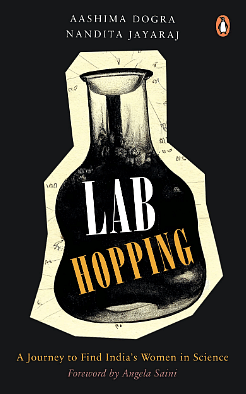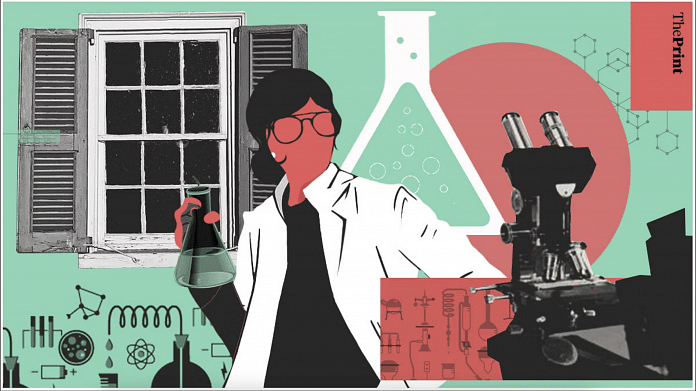Instances of small and big rebellions are widespread in the stories of women in science in India. And not all of them are against societal obstacles. In the course of our travels, we came across numerous women, young and old, who had to rebel against bigoted institutional structures to claim their space in Indian science. They objected to sexism in the hiring committee, demanded justice from a sexual harasser, lobbied for a daycare centre . . . the examples are countless, and many of them will be discussed in upcoming chapters of this book. Each time we had such an encounter, Kavita’s statement about needing to be a rebel to stay in science rang truer.
The trouble is, not all people are intrinsically rebellious. As Rekha Singhal, a researcher we met at the Indian Institute of Forest Management in Bhopal, pointed out, ‘We discourage girls from asking questions. We tell them ‘Bahut savaal puchti ho’ [Don’t ask questions], ‘Bina jaan pehchanwalon se baat mat karo’ [Don’t network], ‘Jaisa kaha hai vaisa karo’ [Do as asked]. In this way, Indian girls are discouraged to think scientifically.’
When we are conditioned for years to suppress any rebellious streak we have, the idea of displeasing authorities can be painful and stress-inducing. We often wondered what gave some women the fortitude to do so. Was there a set of favourable conditions that combined to awaken the dormant rebel within them? What might go on in the mind of a young woman in science while choosing whether or not to rebel?
Jyotsna Dhawan believes that one powerful catalyst is a love for science. In her decades of guiding young researchers, she observed that the decision to commit to science usually comes to a youngster when they understand that they are good at it. ‘The stage where something they predicted actually happens in experimental research—that’s a powerful feeling. Then they begin to realize that a sustained effort at research is worthwhile. After that, it’s almost like a drug,’ she suggested.
For young Archita, this moment came when she joined a top institute as a PhD candidate in 2017. She was born and brought up in a conservative Brahmin family in the same city as her institute in Uttar Pradesh. Her mother was a homemaker and her father was an office superintendent at a local college. Archita never dreamt of becoming a researcher despite being outstanding at academics throughout her school and college life. She said, ‘When I became a gold medallist in my MSc, then I knew I wanted to do something with my life. I was brought up to take up a job like teaching—something that would allow me to handle all the responsibilities expected of a girl. But coming here changed my way of thinking. Here, I saw many women doing fantastic work, devoting their whole life to it. Science, it is a celebration, a lifestyle. I was inspired by people finding interesting questions and ways to answer them.’
Having never left home and being sent to all-girls schools up till then, it was not easy for Archita’s family to digest the fact that their daughter was leaving home to pursue research. She said, frustrated, ‘My father and uncle did not agree with my decision. They think that research, having no definite time frame, will take me away from them. They are afraid I will want to leave home, live abroad . . . They don’t understand research.’
Fortunately, Archita had the backing of her mother, who insisted that only education could give her the respect, honour and everything else that she could want.
With the reluctant permission of her family, Archita was strongly advised to choose a woman as her PhD guide. She did, and she has never regretted it.
‘Ma’am is so polite to me, so supportive. I think she understands me and all aspects of my life. In the lab, she often comes over to my desk to find out how I’m doing, personally and professionally. I know now that in science there is no difference whether your guide is male or female, but it helps in the society that we are living in. My mother and father are happy that my guide is a woman.’
Archita’s love for research consolidated over her first two years as a PhD student, but that passion alone will not ensure an escape from the infamous ‘leaky pipeline’. When we met her, the pressure to agree to an arranged marriage was looming over her head, and Archita admitted to worrying if she had the strength to bear the price of defiance. ‘There are times I have thought of giving up on my studies, but this is all I have. All that matters to me is my research,’ she declared in earnest.
We first met Archita in 2018 as a bright-eyed and eager grad student who was part of the organization team of a scientific meeting being held at her institute. During dinner one night, we found ourselves at a table with Archita and a senior woman biologist who was one of her idols. Over the course of our conversations, the biologist seemingly sensed that Archita needed a pep talk. She advised the young researcher that it might be time to consider flying out of her home nest. She even brought up the possibility of Archita coming over to her lab for a few months to collaborate and experience an academic atmosphere away from the control of her family.
We followed up with Archita some months later and we found her full of hope. She called her interaction with the senior biologist ‘the best conversation of my life’:
‘I returned to my room feeling like the confidence she put in my head and soul was going to change my life. She said you can do anything if you want to. Since then, I have been thinking of becoming a scientist like her. I hope that in the next few years I will have something to be proud of. I know now that I can get support when I want it. I’m not alone in this world.’
This particular scientific meeting was a memorable one for us as lab-hoppers. We got a chance to witness the solidarity among the women in developmental biology, not just over dinner table conversations, but also in the auditorium, when the few women at the meeting, such as stem cell expert Jyotsna Dhawan and neuroscientists Shubha Tole as well as Jonaki Sen, held the mic to engage in lively discussions of each other’s work. This struck us as a deliberate contrast to the typically male dominated discussions at most conferences. We recognized it as a subtle rebellion in its own right.
For transgender and non-binary persons pursuing science, the difficulties are amplified. It’s not just a matter of overcoming one big obstacle like marriage or overprotective parents, rather, for them, every step involves a rebellion. The ignorance among most people of what it even means to be transgender and their exclusion from public spheres ensures that there is little support from biological families of trans persons who are ‘out’ and virtually have no mentors to show them the way in academia.
Grace Banu is an engineer by profession but a transgender activist by necessity. Her activism enabled her to study or lead the kind of life she wanted to. In an interview, Grace recounted how she was discriminated against in school for being a Dalit person. She sat separately from the rest and had different timings. The persecution was so severe that Grace left the school. Meanwhile, she also left her childhood home for a trans commune where she found her chosen family. Here, Grace was encouraged to resume education. Though she could not become a doctor like she wanted to, Grace cracked the competitive entrance exams and joined an engineering college. Despite no scholarship support and a daily commute of five hours, Grace persisted. When she found that she could not afford the examination fees, Grace persuaded the college principal to change the system to make it easier for people like her. Thanks to her efforts, the university issued a notice that transgender students were exempted from paying the examination fees from then on.
Her rebellions continued even after she became a software engineer. When Grace’s daughter Tharika was applying to medical colleges, the duo were dismayed to see no category for transgender persons. Having no other choice, they struck off ‘Male’ and ‘Female’ and wrote ‘Transgender’—only to find out later that Tharika’s application was rejected. There was no way, it seemed, that a transgender person could apply to medical college. Together, the mother and daughter filed a case at the High Court and secured a moral and legal victory when it was ruled that Tharika, being a transgender person with equal rights, would be given admission to the college. With her collective, Trans Rights Now, Grace routinely enables other transgender persons to access their rights to education and employment. Yet, each victory is a bittersweet feeling. She awaits a day when every transgender person will not have to go to court to get justice.
Maybe Kavita is right and there are only two kinds of women who can excel in research—those with support and the rebellious. She was speaking from gendered experiences of her own as well as those of her students, who fell back despite their love for science. In this scenario of privilege or perishment, most women who study science are handed bad cards in the fight against systemic oppression. The Indian scientific community is losing out on a large proportion of capable scientific minds— the women gold medallists in colleges that we all love to celebrate, those pulled back by socially imposed norms, those who are not wired for rebelliousness and those who have not been ‘lucky that way’.
 This excerpt from Lab Hopping: a Journey to find India’s women in science by Aashima Dogra and Nandita Jayaraj has been published with permission from Penguin Random House.
This excerpt from Lab Hopping: a Journey to find India’s women in science by Aashima Dogra and Nandita Jayaraj has been published with permission from Penguin Random House.



